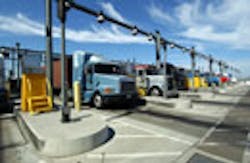It’s been a tough few years for the entire logistics industry – truckers, railroads, ocean carriers, warehouses, etc. – due to the global economic downturn and, according to the just released 20th annual “State of Logistics Report,” it will take a while for things to improve.
“The problem is that, while the global economy may recover, the logistics industry will have to wait because there is still so much stuff in the supply chain pipeline to work through,” Rosalyn Wilson, president of consulting firm R. Wilson Inc. and primary author of the report, told FleetOwner.
“One of the big areas companies make cuts in during a recession is in logistics, and so much of that gets pushed down onto transportation provides like truckers and ocean carriers,” she said. “That’s why we’re seeing rates getting cut down so much, almost below costs in some cases.”
According to this year’s report,” published by the Council of Supply Chain Management Professionals (CSCMP), total U.S. logistics costs dropped to $1.3 trillion in 2008, a decrease of $49 billion from 2007. And after rising over 50% during the previous five years, business logistics costs fell to 9.4% of U.S. gross domestic product (GDP) in 2008, down from 10.1% in 2007.
Inventory-carrying costs plunged 13% in 2008 as well, and that drop was the driving force behind the big decline in logistics costs. The decrease in carrying costs was due to both a 2.2% drop in inventories and an 11.2% decrease in the inventory-carrying rate, according to the report. Warehousing costs, however, rose 9.5% with warehouse managers reporting that inventory turns were down substantially from earlier years as stock spends more time in warehouses, the report’s data indicated.
Transportation costs were only up 2% in 2008 over 2007 levels, which was not enough to offset the steep decline in inventory-carrying costs. Trucking, which comprises 78% of the transportation component, increased 1.3% compared to 4.4% for rail, air, and ocean modes. Truckload industry capacity dropped at unprecedented rates, with freight volumes declining faster than capacity, offering little incentive for fleets to add trucks or even keep current units.
“During 2008, more than 3,000 companies went belly up, removing 7% of the nation's [trucking] capacity. This level of failures has not been seen since the recessionary period in 2000 and 2001,” Wilson noted in the report. “With shipper demand not picking up, trucking capacity continues to be eliminated. Less-than-truckload (LTL) companies, those that consolidate freight shipments at numerous terminals, have 20% excess capacity. Truckload (TL) carriers, those that haul a trailer full of freight, continue to silently consolidate since they primarily are small firms.”
Long-haul and short-haul carriers have had difficulties with pricing strategies as their lengths of haul "flip flop," putting them in unfamiliar markets, she noted. “In essence, it’s become a ‘dog eat dog’ world in trucking at the moment, with TL, LTL, regional and even local trucking carriers cannibalizing each other’s markets in order to find freight and stay in business,” Wilson saidd. As a result, she expects operating ratios for truckload carriers will probably stay flat or even worsen a little until the end of 2009.
One of the longer-term worries for the logistics industry as a whole is that the amount of permanent capacity reductions, coupled with less availability for credit, will make it extremely difficult for the trucking industry to respond to economic growth.
“The lack of capital is a very important fact,” Wilson said. “When the economy recovers and freight picks up, not only will we be right back at a driver shortage, the tighter credit markets will make it harder for fleets to expand. In a lot of ways, trucking is like a light bulb in a refrigerator. You expect it to turn on when you open the door, and when you close it, you just don’t think about it at all.”
All that being said, Wilson believes both the global and U.S. economies – and by extension the logistics industry – are starting to stabilize. She expects to see some recovery in the last quarter of 2009, but also continued weakness entering into 2010. The most important piece of advice she has right now, based on this outlook, is for carriers and shippers alike to become proactive, not reactive – to use the current downturn as a time re-analyze supply chains, re-examine transportation partners and the risks associated with them, increase productivity, and add new technology.
“Shippers should lock in capacity with guarantees before it becomes scarce,” Wilson advised. “We should be looking at more ways to use intermodal and divert truck movements to rail and inland waterways. This will reduce highway wear, address the loss of capacity issues we face in the trucking industry, lower fuel usage and reduce emissions. This is the time to be looking at your distribution networks and freight flows. Make the changes while the economy is slow and there will be minimal disruption of service. You will be well placed when the economy rebounds.”
About the Author
Sean Kilcarr
Editor in Chief
Sean Kilcarr is a former longtime FleetOwner senior editor who wrote for the publication from 2000 to 2018. He served as editor-in-chief from 2017 to 2018.
